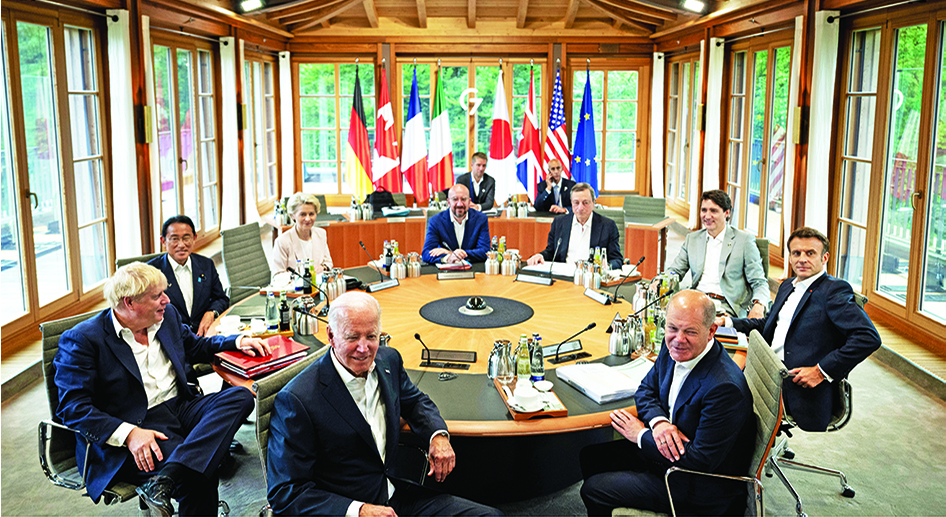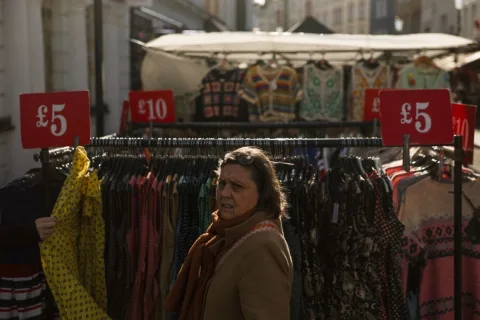ELMAU CASTLE: G7 leaders on Tuesday condemned China's "non-transparent and market-distorting" international trade practices in an end-of-summit statement that hit out directly at Beijing for the first time. The statement, which also pledged to reduce "strategic dependencies" on China, came hours before the leaders join a larger group of their counterparts at a NATO summit in Madrid.
There, the 30-member alliance was also poised to toughen its stance against Beijing in an update of its "strategic concept". The United States has long cast a wary eye at China over its trade practices, which Washington believes are designed to accord an unfair advantage to Chinese companies over foreign firms. Russia's invasion of Ukraine and Beijing's refusal to distance itself from Vladimir Putin has meanwhile prompted other countries, including export giant Germany, to also reconsider their economic reliance on the Asian giant.
In their closing statement following a three-day summit in the Bavarian Alps, the G7 leaders signaled that they would seek to extricate themselves from economic dependence on China. They vowed to "foster diversification and resilience to economic coercion, and to reduce strategic dependencies". The leaders also voiced concern about human rights violations in China, urging Beijing to respect fundamental freedoms.
They stressed that the situation in Tibet, and in Xinjiang, where there is "forced labor", "is of major concern to us". The statement also urged China to "honor its commitments" under the Sino-British Joint Declaration, in which Beijing agreed Hong Kong could keep some freedoms and autonomy for 50 years under a "One Country, Two Systems" model. It also pressed Beijing to get Russia to withdraw from Ukraine.
Serious danger
After several years of detente and cooperation as China caught up economically with the West, Beijing has since taken a more assertive tone on the world stage. Western allies acknowledge that the world's biggest challenges, including climate change, cannot be solved without Beijing's cooperation, but have become more wary about China's actions and aims.
The export powerhouse has over recent years offered billions in investments and loans to build roads, rail and bridges in poorer countries around the world. While greeted enthusiastically in the beginning, receiving countries have later found themselves mired in debt. German Chancellor Olaf Scholz recently warned that China's years-long lending spree in poorer countries, particularly in Africa, poses a "serious danger" that could even plunge the world into the next financial crisis.
Critics have also accused Beijing of seeking to buy influence in the south. To offer an alternative to the world's poorest, the G7 on Sunday pledged $600 billion for global infrastructure programs. European Commission President Ursula von der Leyen said the huge program showed partners in the developing world "that they have a choice". Beyond economic aid, Western allies are also poised for the first time to pivot their military strategy to address the challenges posed by China. The update of the "strategic concept" is the alliance's first in a decade.
Food stockpiles
Meanwhile, G7 industrialized nations on Tuesday urged countries and companies with large food stockpiles to help ease a hunger crisis sparked by Russia's invasion of Ukraine. "We call on those partners with large food stockpiles, as well as on the private sector, to make food available without distorting the market," the Group of Seven leaders said in a statement after a summit in Germany.
They called "on all countries to avoid excessive stockpiling of food which can lead to further price increases". The war in Ukraine, a country known as Europe's breadbasket, has pushed up food prices and led to shortages, as Russia's blockade of Black Sea ports prevents millions of tons of grain from being shipped out.
The crisis has sparked fears of famine in vulnerable countries highly reliant on Ukrainian exports, particularly in Africa. The issue was a key topic of discussion at a three-day summit of the G7 - comprising Britain, Canada, France, Germany, Italy, Japan and the United States-held in the Bavarian Alps. In their final communique, G7 leaders pledged an additional $4.5 billion to combat global food insecurity, bringing the total sum committed this year to more than $14 billion.
They again urged Russia to "end its blockade of Ukrainian Black Sea ports, destruction of key port and transport infrastructure, grain silos and terminals, illegal appropriation by Russia of agricultural commodities and equipment in Ukraine". These actions "can only be assessed as a geopolitically motivated attack on global food security", they said. Russia denies being responsible for the food crisis and blames the delivery disruptions on Western sanctions. - AFP











